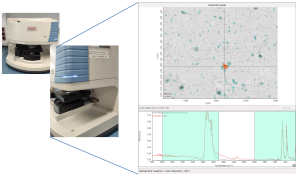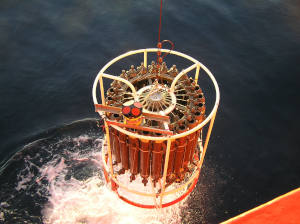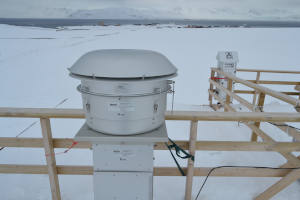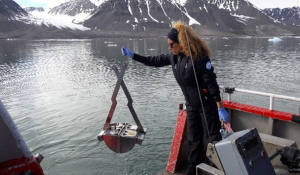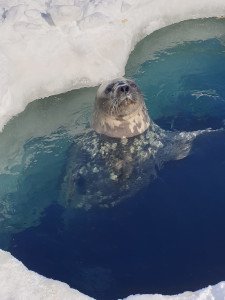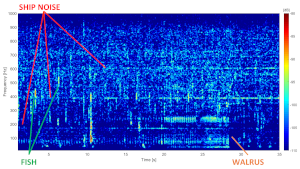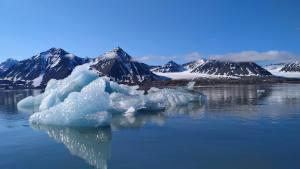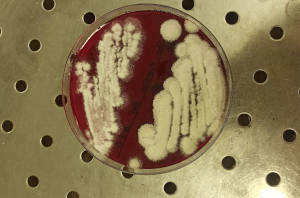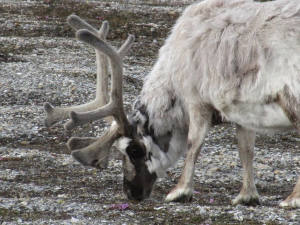English_content
 Degree in Physics, University of Padua; Post Graduate School in Maritime and Coastal Engineering, University of Padua. In 1996-1997 Human Capital Mobility EC grant at Proudman Oceanographic Laboratory (Birkenhead-Liverpool, UK) where he made research on numerical and physical sensitivity in coastal and shallow water environments.
Degree in Physics, University of Padua; Post Graduate School in Maritime and Coastal Engineering, University of Padua. In 1996-1997 Human Capital Mobility EC grant at Proudman Oceanographic Laboratory (Birkenhead-Liverpool, UK) where he made research on numerical and physical sensitivity in coastal and shallow water environments.
Researcher at CNR from 1998, presently Director of Research at the Institute of Polar Sciences of the Italian National Research Council (CNR-ISP). He has done research work on wind wave modelling and on coastal processes with special focus on sediment transport; the models used are numerical wave and sediment transport models coupled with 3D circulation models. His research interests currently are the physical processes at the air-water and water-sediment interfaces, the wave-current coupling and the wave climate variations due to climate changes and their impact on coastal vulnerability. Other interests include the application of indicators for the integrated management of the coastal zone and the measurements of wave spectra with stereoscopic techniques.
Co-author of more than 70 scientific papers in ISI journals and of more than 150 conference papers; co-author of 2 patents and editor of MEDATLAS: Wind and Wave Atlas of the Mediterranean Sea. He participated in and coordinated several national and international research projects. In 2017 and 2018 he has been Head of the Institute of Marine Sciences of the Italian National Research Council (CNR-ISMAR).
Scopus - Author ID: 7004338399 Google Scholar Research Gate
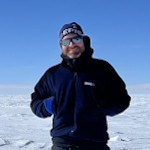 Senior Research Fellow within the European H2020 project Beyond EPICA Oldest Ice Core: 1.5 Myr of greenhouse gas -climate feedbacks.
Senior Research Fellow within the European H2020 project Beyond EPICA Oldest Ice Core: 1.5 Myr of greenhouse gas -climate feedbacks.
MSc in Geophysical Sciences (University of Catania) and PhD in Science and Management of Climate Change (Ca' Foscari-Venice).
His research line focuses mainly on two topics: i) the reconstruction of past climatic and environmental conditions based on ice core records and ii) the study of the chemical and physical properties of the seasonal snowpack in the Arctic environment.
He is currently involved in the analysis of glacial archives from polar and alpine regions (i.e. ice cores, snow, and firn), using mass spectrometry techniques for trace elements determination. He is particularly interested in the study of halogens (bromine and iodine) in glacial records, and their link with seasonal sea ice fluctuations, as well as the study of biogeochemical cycles of heavy metals, organic compounds, black carbon, mercury, and microplastics in the Arctic cryosphere. Since 2018, he has been part of the Italian team of Ice Memory, an international research project aimed at preserving the climate signal recorded in mountain glaciers around the world. Since 2019, he has been responsible for the long-term chemo-physical snow monitoring program in Ny-Ålesund (Svalbard). During the 2023-24 and 2024-25 drilling seasons, he participated in the international research project Beyond Epica Oldest Ice at Little Dome C (LDC) in the Antarctic plateau, where he contributed to the processing of the extracted ice core. In his career, he has participated in numerous scientific expeditions to polar regions, including the Arctic (Svalbard, Alaska), Antarctica (LDC), as well as high altitude alpine areas (>4200m), and subterranean glacial environments. He has contributed, as first author or co-author, to more than 20 scientific articles published in international peer-reviewed journals.
![]() https://orcid.org/0000-0003-2498-3227 Google Scholar
https://orcid.org/0000-0003-2498-3227 Google Scholar
 Geosciences graduate from the University of Trieste, currently pursuing a PhD in Polar Sciences at Ca' Foscari University as part of the Local Glaciers Sisimiut (LoGS) project.
Geosciences graduate from the University of Trieste, currently pursuing a PhD in Polar Sciences at Ca' Foscari University as part of the Local Glaciers Sisimiut (LoGS) project.
His research interests revolve around the cryosphere in polar and alpine environments, employing a combination of remote sensing, geomorphological and glaciological techniques.
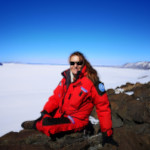 Laura Selbmann, MSc in Biological Sciences, PhD in Biological Evolution and Biochemistry, Associate Professor at the University of Tuscia, Viterbo. Regular guest at the Westerdijk Institute, The Netherlands from 2004 to 2010. Member of the Life Science Group of the Scientific Committee for Research in Antarctica (SCAR) since 2021. Member of MIRRI-Italia (Microbial Resource Research Infrastructure) since 2019. Since 2009 Scientific Director of the Italian National Museum of Antarctica (MNA), Mycological Section, Genoa, Italy. Her main field of study concerns microorganisms from extreme environments and in particular fungi, coordinator of many national and international projects (PNRA, PRIN, ASI, JGI, EMSL). He has participated in 4 Italian Antarctic expeditions (2010-11, 2015-16, 2018-19 and 2021-22), both at the "Mario Zucchelli" Station and the US "McMurdo" Station. He has dedicated his professional life to the study of Antarctic microbial cryptoendolithic communities to investigate their evolution and adaptation during extremes and explore them as early warning systems to monitor the effect of climate change. To date he has described more than 20 new fungal genera and more than 50 new fungal species, most of which from Antarctica. He has published > 140 articles and 4 book chapters. H index 41 Scopus; >8k citations.
Laura Selbmann, MSc in Biological Sciences, PhD in Biological Evolution and Biochemistry, Associate Professor at the University of Tuscia, Viterbo. Regular guest at the Westerdijk Institute, The Netherlands from 2004 to 2010. Member of the Life Science Group of the Scientific Committee for Research in Antarctica (SCAR) since 2021. Member of MIRRI-Italia (Microbial Resource Research Infrastructure) since 2019. Since 2009 Scientific Director of the Italian National Museum of Antarctica (MNA), Mycological Section, Genoa, Italy. Her main field of study concerns microorganisms from extreme environments and in particular fungi, coordinator of many national and international projects (PNRA, PRIN, ASI, JGI, EMSL). He has participated in 4 Italian Antarctic expeditions (2010-11, 2015-16, 2018-19 and 2021-22), both at the "Mario Zucchelli" Station and the US "McMurdo" Station. He has dedicated his professional life to the study of Antarctic microbial cryptoendolithic communities to investigate their evolution and adaptation during extremes and explore them as early warning systems to monitor the effect of climate change. To date he has described more than 20 new fungal genera and more than 50 new fungal species, most of which from Antarctica. He has published > 140 articles and 4 book chapters. H index 41 Scopus; >8k citations.
Google scholar
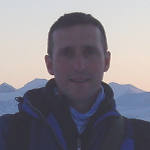 He received his bachelor's degree in Chemistry at the University of Florence in 2000. From 2001 to 2004, in the framework of his PhD at the Department of Chemistry, University of Florence, he worked on the development of semi-continuous ion chromatography coupled to Flow Analysis systems within the European project EPICA (European project for Ice Coring in Antarctica). On 20 April 2004 he got his PhD in Chemical Sciences. He took part in the national research campaigns in Antarctica 2001-2002 and 2003-2004 in the bases of Dome Concordia and Baia Terra Nova running chromatographic analyses in situ on a deep ice core perforated at Dome C as part of the EPICA project.
He received his bachelor's degree in Chemistry at the University of Florence in 2000. From 2001 to 2004, in the framework of his PhD at the Department of Chemistry, University of Florence, he worked on the development of semi-continuous ion chromatography coupled to Flow Analysis systems within the European project EPICA (European project for Ice Coring in Antarctica). On 20 April 2004 he got his PhD in Chemical Sciences. He took part in the national research campaigns in Antarctica 2001-2002 and 2003-2004 in the bases of Dome Concordia and Baia Terra Nova running chromatographic analyses in situ on a deep ice core perforated at Dome C as part of the EPICA project.
Since June 2002, he took part to several EPICA-DML and TALDICE ice core processing campaigns at the Alfred Wegener Institute for Polar and Marine Research in Bremerhaven (D). He participated to numerous sampling campaigns in the Arctic (at the Dirigibile Italia base in Ny Alesund) for the study of climate change through the monitoring of atmospheric aerosol. From December 2004 to 31st January 2018 he was the holder of several fellowships and research grants focused on to the development and application of analytical methods on ice cores and climate archives. From 01/02/2018 to 30/11/2018 he was Fixed term Researcher (RTDa) at the "Ugo Schiff" Department of Chemistry of the University of Florence SSD CHIM / 01. Starting from 01/12/2018 he held the position of Tenure track Researcher (RTDb) at the "Ugo Schiff" Department of Chemistry of the University of Florence SSD CHIM / 01. He is associated Professor at University of Florence since 1st December 2021.
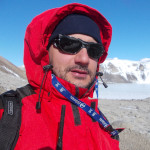 Education
Education
2010 – PhD (Environmental Science: Marine Environment and Resource) University of Messina Italy
2005 – Degree in Biological Science (110/110 with academic price). University of Messina Italy. Erasmus student at the National University of Ireland, Galway (Ireland).
He is currently a researcher at the Institute of Polar Sciences (CNR-ISP). He is currently involved in Marine microbiology ecology and Biotechnology in particular:
• Application of omics techniques to study microbial diversity.
• Microbial biodiversity in extreme environment: deep sea, shallow and deep hydrothermal vents, hypersaline environments, Antarctic sea Ice, and subglacial lakes.
• Microbial bioremediations in oil-polluted environments
• Biotechnologies for marine bioremediation.
• Biotechnology application of microbes isolated from extremes environments.
Participant in NSF-sponsored project and different European Union Funded project Participant in several oceanographic expeditions aboard R/V Urania, R/V Europe, R/V Minerva I, R/V L’Atalante, R/V Laura Bassi. Participant in several field-work and 3 Antarctic expeditions.
Reviewer for the peer review journal for Environmental Microbiology, Environmental Pollution, Environmental Microbiology Reports, Journal of Cleaner Production, Marine Genomics, Microorgansims, Marine Science and Engineering, Diversity, Chemosphere. Extreme Microbiology (specialty section of Frontiers in Microbiology).
![]() https://orcid.org/0000-0002-8385-564X Scholar Scopus - Author ID: 15061770400
https://orcid.org/0000-0002-8385-564X Scholar Scopus - Author ID: 15061770400
 BSc Degree in Geology at the University of Pisa in April 2016, with a thesis on the acquisition of new dendrochronological curves for the implementation of the existing dataset of Larix decidua Miller in Alta Val di Sole. In October 2017 she pursued a MSc Degree in Geological Sciences and Technologies at the University of Pisa, with a dissertation on new surface exposure ages (3He) of deposits and surfaces of glacial erosion in Northern Victoria Land for the reconstruction of Pleistocene variations of the East-Antarctica sheet. Postgraduate trainee at the Scottish Universities Environmental Research Center (SUERC) in Glasgow (UK) from January to April 2018, and UniPi fellow (August-September 2018). PhD (2018-2022) in Science and Management of Climate Change (Ca' Foscari University of Venice) with a project focused on the development of a new Continuous Flow Analysis system (CFA) for the determination of biomass burning tracers, trace elements and insoluble dust particles in Alpine ice cores, with palaeoclimatological reconstructions of the Grand Combin (Switzerland) and Weißseespitze (Austria) glaciers. Currently research fellow at the CNR Institute of Polar Sciences (CNR-ISP) in Venice Mestre, for the FISR-Ice Memory-An International Salvage Program project. Her project focuses on the implementation of hardware/software systems for the development of innovative analytical techniques for the analysis of ice cores through CFA systems.
BSc Degree in Geology at the University of Pisa in April 2016, with a thesis on the acquisition of new dendrochronological curves for the implementation of the existing dataset of Larix decidua Miller in Alta Val di Sole. In October 2017 she pursued a MSc Degree in Geological Sciences and Technologies at the University of Pisa, with a dissertation on new surface exposure ages (3He) of deposits and surfaces of glacial erosion in Northern Victoria Land for the reconstruction of Pleistocene variations of the East-Antarctica sheet. Postgraduate trainee at the Scottish Universities Environmental Research Center (SUERC) in Glasgow (UK) from January to April 2018, and UniPi fellow (August-September 2018). PhD (2018-2022) in Science and Management of Climate Change (Ca' Foscari University of Venice) with a project focused on the development of a new Continuous Flow Analysis system (CFA) for the determination of biomass burning tracers, trace elements and insoluble dust particles in Alpine ice cores, with palaeoclimatological reconstructions of the Grand Combin (Switzerland) and Weißseespitze (Austria) glaciers. Currently research fellow at the CNR Institute of Polar Sciences (CNR-ISP) in Venice Mestre, for the FISR-Ice Memory-An International Salvage Program project. Her project focuses on the implementation of hardware/software systems for the development of innovative analytical techniques for the analysis of ice cores through CFA systems.
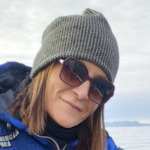 Francesca Spataro graduated in Chemistry and gained a PhD in Chemical Sciences Program at the Sapienza University in Rome; she has worked firstly with research fellows and then with a fixed-term research contract from 2005 to 2016, at the Institute on Atmospheric Pollution Research of the National Research Council (IIA-CNR). From 2016 to 2018, she carried out her research activities at the Water Research Institute (IRSA-CNR), and from 1 August 2019 she is working at the Institute of Polar Sciences (ISP-CNR), Research Area of Rome - Montelibretti .
Francesca Spataro graduated in Chemistry and gained a PhD in Chemical Sciences Program at the Sapienza University in Rome; she has worked firstly with research fellows and then with a fixed-term research contract from 2005 to 2016, at the Institute on Atmospheric Pollution Research of the National Research Council (IIA-CNR). From 2016 to 2018, she carried out her research activities at the Water Research Institute (IRSA-CNR), and from 1 August 2019 she is working at the Institute of Polar Sciences (ISP-CNR), Research Area of Rome - Montelibretti .
Dr. Spataro has gained experience in field monitoring campaigns in polar (Arctic) and temperate regions, through National and International projects.
Her research activities focus on:
- Formation, transport and removal processes of gaseous and particulate nitrogenous and halogenated inorganic pollutants.
- Heterogeneous processes involving nitrogen contaminants (especially NOx, NH3, HONO, HNO3).
- Study of the persistence of legacy and emerging organic micro-pollutants in different environmental compartments.
- Development and optimization of analytical methods for the determination of emerging organic contaminants (in particular pharmaceuticals, including antibiotics).
- Determination of persistent and emerging organic micropollutants in different environmental matrices through the combination of extraction techniques (pressurized liquid extraction, solid phase extraction, separatory funnels) with analytical techniques (spectrometry, HPLC coupled with UV detection, fluorescence and mass spectrometry).
Scopus - Author ID: 36605258800
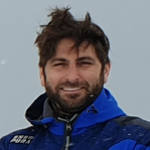 I am interested in paleoclimate and snow chemistry studies including elements and compounds post-depositional and photochemical process in surface snow and snow-atmosphere interactions. My main topic is trace elements measurements in ice cores with particular focusing on iron (includes its chemical speciation) for its role in the ocean fertilization, and halogens measurements for their connections with sea ice changes. I am also interest in the impact caused by the ancient civilization on atmospheric composition. I am involved in aerosol measurements in polar environment for understand the natural cycle of trace elements, biogenic compound and black carbon and their possible changes in the recent decades. I participate in several field expeditions in Arctic, Antarctic and Alpine regions. I am actively involved in glacier mass balance estimations.
I am interested in paleoclimate and snow chemistry studies including elements and compounds post-depositional and photochemical process in surface snow and snow-atmosphere interactions. My main topic is trace elements measurements in ice cores with particular focusing on iron (includes its chemical speciation) for its role in the ocean fertilization, and halogens measurements for their connections with sea ice changes. I am also interest in the impact caused by the ancient civilization on atmospheric composition. I am involved in aerosol measurements in polar environment for understand the natural cycle of trace elements, biogenic compound and black carbon and their possible changes in the recent decades. I participate in several field expeditions in Arctic, Antarctic and Alpine regions. I am actively involved in glacier mass balance estimations.
Scopus - Author ID: 54962645400 ![]() http://orcid.org/0000-0001-8635-9193 ResearchGate Google Scholar
http://orcid.org/0000-0001-8635-9193 ResearchGate Google Scholar
Director - PANIERI GIULIANA - direttore.isp AT cnr.it - Phone: +39 041-2348659
Staff
Contact with name.surname AT cnr.it
ADEMOLLO NICOLETTA
- Bologna - Researcher
ANTONELLI GIUSEPPE
- Bologna - Technician
ARGIRIADIS ELENA
- Venezia - Researcher - Phone: +39 041-2348658
AZZARO FILIPPO
- Messina - Researcher - Phone: +39 090-6015419
AZZARO MAURIZIO
- Messina - Senior Researcher - Phone: +39 090-6015415
BARBARO ELENA
- Venezia - Researcher - Phone: +39 041-2348504
BEATRICI DANIELA
- Roma-Tor Vergata - Technician - Phone: +39 06-45488568
BECHERINI FRANCESCA
- Venezia - Senior Researcher - Phone: +39 041-2346761
CAIRNS WARREN RAYMOND LEE
- Venezia - Senior Researcher - Phone: +39 041-2348992
CARNIEL SANDRO
- Venezia - Research Director
CARUSO GABRIELLA
- Messina - Senior Researcher - Phone: +39 090-6015423
CASULA MARCO
- Venezia - Technician (in temporary assignment at another facility of the Institution)
CAVALIERE ALICE
- Bologna - Technologist
CESTER VALENTINA
- Venezia - Technician - Phone: +39 041-2348547
CIALLI PAMELA
- Roma-Tor Vergata - Administrative assistant - Phone: +39 06-45488349
COLUCCI RENATO R.
- Venezia - Researcher - Phone: +39 040-3756876
CORAMI FABIANA
- Venezia - Researcher - Phone: +39 041-2348658
COSENZA ALESSANDRO
- Messina - Technician - Phone: +39 090-6015439
COZZI GIULIO
- Venezia - Researcher - Phone: +39 041-2348935
CRISAFI FRANCESCA
- Messina - Researcher
DALLO FEDERICO
- Venezia - Researcher - Phone: +39 041-2348937
DE BIASIO FRANCESCO
- Venezia - Researcher - Phone: +39 041-2348938
DE BLASI FABRIZIO
- Venezia - Researcher
DECEMBRINI FRANCO
- Messina - Researcher - Phone: +39 090-6015413
DI FRANCO SABINA
- Roma-Montelibretti - Technologist - Phone: +39 06-90672394
DI LEO GUGLIELMO
- Messina - Technician
DI MAURO BIAGIO
- Milano - Researcher - Phone: +39 02-66173404
FILICIOTTO FRANCESCO
- Messina - Researcher - Phone: +39 090-6015420
GABRIELI JACOPO
- Venezia - Senior Researcher - Phone: +39 041-2348911
GIGLIO FEDERICO
- Bologna - Researcher - Phone: +39 051-6398904
GILARDONI STEFANIA
- Milano - Senior Researcher - Phone: +39 02-66173328
GIORDANO PATRIZIA
- Bologna - Researcher - Phone: +39 051-6398902
GREGORIS ELENA
- Venezia - Researcher - Phone: +39 041-2348937
IAKIMOV MIKHAIL
- Messina - Research Director
LA CONO VIOLETTA
- Messina - Researcher
LA MESA MARIO
- Bologna - Senior Researcher - Phone: +39 071-2078838
LA SPADA GINA
- Messina - Researcher
LANGONE LEONARDO
- Bologna - Research Director - Phone: +39 051-6398870
LO GIUDICE ANGELINA
- Messina - Senior Researcher - Phone: +39 090-6015414
LUPI ANGELO
- Bologna - Researcher - Phone: +39 051-6399588
MAIMONE GIOVANNA
- Messina - Technician - Phone: +39 090-6015423
MAZZOLA MAURO
- Bologna - Researcher - Phone: +39 051-6399592
MISEROCCHI STEFANO
- Bologna - Senior Researcher - Phone: +39 051-6398880
MONTAGNA PAOLO
- Bologna - Research Director - Phone: +39 051-63988913
NOGAROTTO ALESSIO
- Bologna - Technician
PALADINI DE MENDOZA FRANCESCO
- Messina - Researcher
PANSERA MARCO
- Messina - Researcher
PAPALE MARIA
- Messina - Researcher
PATROLECCO LUISA
- Roma-Montelibretti - Senior Researcher - Phone: +39 06-90672797
PESCATORE TANITA
- Bologna - Researcher
PLINI PAOLO
- Roma-Montelibretti - Researcher - Phone: +39 06-90672392
PORCINO NUNZIATINA
- Messina - Researcher
RAPPAZZO ALESSANDRO CIRO
- Messina - Technician
RAUSEO JASMIN
- Roma-Montelibretti - Researcher
SACCHETTO ALESSIO
- Padova - Administrative assistant
SALERNO FRANCO
- Milano - Senior Researcher (temporary assignment)
SCALABRIN ELISA
- Venezia - Researcher – Phone: +39 041-2348938
SCIACCA VIRGINIA
- Messina - Researcher
SCLAVO MAURO
- Padova - Research Director - Phone: +39 049 8295907
SMEDILE FRANCESCO
- Messina - Researcher
SPATARO FRANCESCA
- Roma-Montelibretti - Researcher - Phone: +39 06-90672852
SPOLAOR ANDREA
- Venezia - Senior Researcher
TESI TOMMASO
- Bologna - Senior Researcher - Phone: +39 051-6398864
TURETTA CLARA
- Venezia - Senior Researcher - Phone: +39 041-2348947
VALENTINI EMILIANA
- Roma-Montelibretti - Researcher
VARDE' MASSIMILIANO
- Venezia - Researcher - Phone: +39 041-2348938
VENIER CHIARA
- Venezia - Technologist
VERAZZO GIULIO
- Bologna - Technologist
VITALE VITO
- Bologna - Research Director - Phone: +39 051-6399595
ZANELLA JACOPO
- Padova - Technician - Phone: +39 049-8295714
ZANGRANDO ROBERTA
- Venezia - Senior Researcher - Phone: +39 041-2348945
ZANOTTO EMANUELA
- Venezia - Technician - Phone: +39 041-2348902
ZUCCHETTA MATTEO
- Venezia - Researcher - Phone: +39 041-2348937
More...
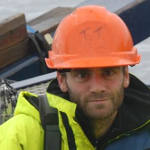 MS (2003) and PhD (2006) in Environmental Marine Sciences (University of Bologna).
MS (2003) and PhD (2006) in Environmental Marine Sciences (University of Bologna).
Dr. Tesi research focuses on climate change in present and ancient systems affecting sea ice and permafrost. He was awarded with two Marie Curie fellowships to work at the Oregon State University (USA) and University of Stockholm (Sweden). He is in the Editorial Board of the Marine Chemistry journal (Elsevier) with focus on marine organic biomarkers and Guest Editor of the Ocean Science journal (Copernicus). He is the Italian representative and member of IASC (International Arctic Science Committee) Marine Working Group. He has published 50 scientific papers in peer-reviewed journals dealing with the use of fossil biomarkers to investigate modern and paleo climate change. He served as chairman at the European Geosciences Union (EGU) meeting in Vienna (Austria) and at the American Geophysical Union (AGU) Fall meeting in San Francisco (USA). He has participated to 17 oceanographic expeditions in the Mediterranean Sea and Arctic combined accounting for over 200 days of at sea activities.
![]() http://orcid.org/0000-0002-1686-3375
http://orcid.org/0000-0002-1686-3375
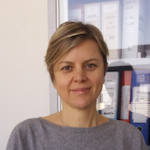 Diploma of maturity achieved in 1993 at Technical-Commercial Institute Paolo Sarpi of Venice.
Diploma of maturity achieved in 1993 at Technical-Commercial Institute Paolo Sarpi of Venice.
From February 2002 to October 2005 she worked at Pago Italia Srl in Dosson (TV) dealing mainly with the issue of active and passive invoices and payments. From June 1999 to February 2002 she was employed at Cinquegrani Sas in Quarto d'Altino where she worked on invoicing clients and suppliers, verification of payments and relations with the public. From June 1996 to March 1999 she worked in front office at the dealership VW Audi Pole Position Spa in Mestre, also dealing with billing customers and first known cash. From 2005 to 2010 temporary position at the Institute for the Dynamics of Environmental Processes (IDPA) of the CNR, Administrative Staff-Level VII; since 2010 permanent position at the Institute for the Dynamics of Environmental Processes (IDPA) of the CNR, Administrative Staff-Level VII. In 2019 she moved to the Institute of Polar Sciences (ISP).
In her activity at the CNR, Elisa Tessarin mainly deal with the procedures related to the orders of expense billing registration, management of staff attendance through dedicated computer tools, Organization of medical examinations for suitability for work, procedures for reimbursement of missions (work trips) of staff, computer protocol and is treasurer of the Institute.
In 2019, thanks to a dedicated funding program by the Ministry of University and Research (MUR), Italy acquired a research ship with ice-breaking capabilities to conduct research activities in the polar regions. The research vessel was named after Laura Bassi, the first woman in the world to obtain an official academic professorship, and she did this at the University of Bologna in the 18th century.
The vessel is owned by the National Institute of Oceanography and Applied Geophysics (OGS) in Trieste and receives funds to conduct research activities from the National Research Program in Antarctica (PNRA). It also serves the polar scientific community thanks to an agreement between the major Research Institutes in Italy working in the polar regions and those managing the polar infrastructures (OGS, CNR and ENEA). The use of the R/V Laura Bassi has also been included in the strategic planning of the Italian Arctic Research Program (PRA).
The R/V Laura Bassi made its first expedition to the Ross Sea (Antarctica) in the austral summer of 2019-2020.
An extensive instrumental upgrade to the vessel is currently underway, with the contribution of the ISP staff, to convert it into a modern multipurpose scientific platform that can serve different scientific communities working on various research fields, including physical, chemical and biological oceanography, paleoceanography, geophysics, marine geology and atmospheric physics and chemistry.
For more information please refer to the OGS website.
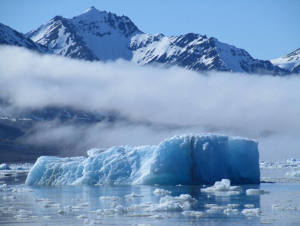 The research activities carried out within the Thematic Area Contaminants and Ecosystems are aimed at studying the sources, transport dynamics, diffusion and fate of regulated and emerging contaminants, including micro/nano-plastics and trace elements, in polar ecosystems. These ecosystems are particularly sensitive to external perturbations, such as human activities and climate change. In fact, the Polar regions constitute the final sink for many pollutants emitted at mid-latitudes and transported on a regional and global scale (long-range) through atmospheric and oceanic circulation and migratory animals: all drivers influenced by the ongoing climate change. Global warming has also favored a growing anthropic impact in the polar areas due to the development of tourist activities, mining and maritime traffic with a consequent increase in the local input of contamination, including noise pollution. The direct and indirect effects of these changes combined with the different dynamics of contamination are causing the fragmentation and destruction of habitats, the alteration of aquatic and terrestrial food webs, as well as loss of diversity with repercussions also on Arctic populations.
The research activities carried out within the Thematic Area Contaminants and Ecosystems are aimed at studying the sources, transport dynamics, diffusion and fate of regulated and emerging contaminants, including micro/nano-plastics and trace elements, in polar ecosystems. These ecosystems are particularly sensitive to external perturbations, such as human activities and climate change. In fact, the Polar regions constitute the final sink for many pollutants emitted at mid-latitudes and transported on a regional and global scale (long-range) through atmospheric and oceanic circulation and migratory animals: all drivers influenced by the ongoing climate change. Global warming has also favored a growing anthropic impact in the polar areas due to the development of tourist activities, mining and maritime traffic with a consequent increase in the local input of contamination, including noise pollution. The direct and indirect effects of these changes combined with the different dynamics of contamination are causing the fragmentation and destruction of habitats, the alteration of aquatic and terrestrial food webs, as well as loss of diversity with repercussions also on Arctic populations.
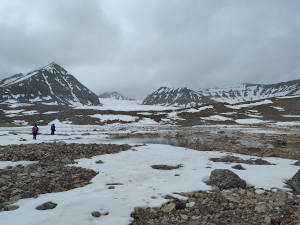 In this context, the multidisciplinary skills that converge in this Thematic Area constitutes an indispensable requirement for understanding the effects due to anthropic impact and climate change in polar ecosystems by following a One Health approach and aiming at a sustainable management of these vulnerable environments in the near future.
In this context, the multidisciplinary skills that converge in this Thematic Area constitutes an indispensable requirement for understanding the effects due to anthropic impact and climate change in polar ecosystems by following a One Health approach and aiming at a sustainable management of these vulnerable environments in the near future.
The main lines of investigation refer to the following areas: development and optimization of highly sensitive analytical methods for the detection of pollutants in the abiotic and biotic environmental compartments, understanding of transport and distribution processes in ecosystems, evaluation of the interactions with biota and the ecological effects, study of the capability of ecosystems to adapt and respond to contamination.
Main ERC panels:
• LS8 - Environmental Biology, Ecology and Evolution
• PE4 - Physical and Analytical Chemical Sciences
• PE10 - Earth System Science
Referents: Elena Barbaro, Maria Papale, Luisa Patrolecco, Francesca Spataro
Contact: info-impacts AT isp.cnr.it
Sottotematiche
Legacy and emerging polluntants
From the development of analytical methods to the study of environmental processes
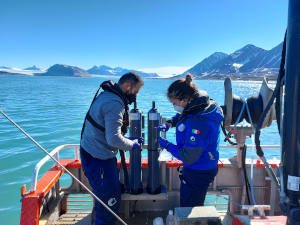 Despite the geographical isolation and limited human presence, polar regions are strongly affected by long-range transport leading to the dispersion of pollutants emitted in low and medium latitudes and on a local scale. Scientific research efforts have allowed the collection of long-term data on the presence of heavy metals and persistent organic contaminants (POPs) in the Arctic; however, there are still no systematic monitoring programs for such compounds in Antarctica.
Despite the geographical isolation and limited human presence, polar regions are strongly affected by long-range transport leading to the dispersion of pollutants emitted in low and medium latitudes and on a local scale. Scientific research efforts have allowed the collection of long-term data on the presence of heavy metals and persistent organic contaminants (POPs) in the Arctic; however, there are still no systematic monitoring programs for such compounds in Antarctica.
More recently, attention has been focused on new classes of contaminants, defined as emerging, because they are not yet included in current regulations. The effects of these compounds on the organisms and environment are still not fully known. The determination of the occurrence of these substances in the environment and the evaluation of their effects on ecosystems is an important scientific challenge, especially considering their different chemical-physical properties and the continuous production of new formulations. Since many emerging contaminants are bioactive molecules with potentially harmful effects on the organisms and environment even at low concentrations, the development of suitable monitoring programs has crucial importance. The Arctic Monitoring and Evaluation Program (AMAP) has indicated that the risk due to the presence of emerging chemical pollutants but also the more investigated persistent organic pollutants (POPs) and mercury at the poles is still very high. Therefore, it is of priority interest to deepen the knowledge of this issue in the polar areas.
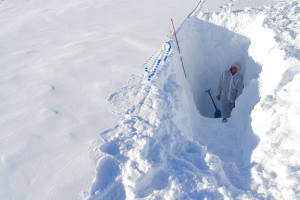 The main research activities concern:
The main research activities concern:
• Optimization, and standardization of analytical methods for the determination of legacy pollutants (e.g. PAHs, PCBs, PBDEs, organo-chlorinated pesticides, etc.), emerging (e.g. pharmaceutical residues, fragrances, perfluorinated compounds, new generation pesticides, etc.) compounds and their metabolites/transformation products. Suspect screening analysis (performed when there is evidence/information that a given structure could be present in the samples) and non-target screening (analysis of all detected components, when no preliminary information is available).
• Development of chemical speciation methods for the identification of biologically active species or species produced by photochemical reactions.
• Continuous and long-term monitoring of organic and inorganic contaminants transported by atmospheric (Gruvebadet - Aerosol laboratory) and oceanic currents (Mooring) via permanent platforms.
• Studies on bioconcentration / biomagnification in the food web (screening assessment); evaluation of antibiotic susceptibility profiles of bacterial strains isolated from water/sediment.
• In-situ and real-time monitoring of organic and inorganic contaminants by using biosensors.
• Development and application of metabolomic analysis in environmental matrices for the study of degradative processes that determine the production of potentially polluting metabolites; this approach makes it possible to identify the presence of unknown pollutants and to relate them to the biological processes taking place in the system.
• Laboratory scale studies (e.g., microcosm and batch) to evaluate biotic and abiotic (chemical and physical) degradation processes (DT50 calculation), formation of metabolites and transformation products, and bioaccumulation in target organisms (vegetable and animal species).
• Optimization, standardization and validation of innovative biotechnologies for the in situ bioremediation and bio-mitigation of environmental matrices impacted by organic and inorganic contaminants.
Main ERC Panels:
• PE4_5 - Analytical chemistry
• PE4_7 - Chemical instrumentation
• PE4_9 - Method development in chemistry
• PE4_18 - Environment Chemistry
• PE10_1 - Atmospheric chemistry, atmospheric composition, air pollution
• PE10_8 - Oceanography (physical, chemical, biological, geological)
• PE10_9 - Biogeochemistry, biogeochemical cycles, environmental chemistry
• PE10_17 - Hydrology, hydrogeology, engineering and environmental geology, water and soil pollution
 Ministero dell'Universita e Ricerca
Ministero dell'Universita e Ricerca
Programma Ricerche Artico
Programma Nazionale di Ricerca in Antartide
 Ministero degli Affari Esteri e della Cooperazione Internazionale
Ministero degli Affari Esteri e della Cooperazione Internazionale
L'Italia e l’Artico
L’Italia e l’Antartide
CNR-ISP
National Research Council
Institute of Polar Sciences
c/o Scientific Campus - Ca' Foscari University Venice - Via Torino, 155 - 30172 VENEZIA MESTRE (VE)
Phone: +39 041 2348547 - E-mail: protocollo.isp AT pec.cnr.it
Fax: +39 041 2348 549 - Codice Fiscale: 80054330586 - P.I.:02118311006
Unless otherwise indicated, the content of this site is licensed : Attribution Non Commercial Share Alike 4.0 International (CC BY-NC-SA 4.0)
Privacy policy e Cookie policy - Transparent administration (CNR)







